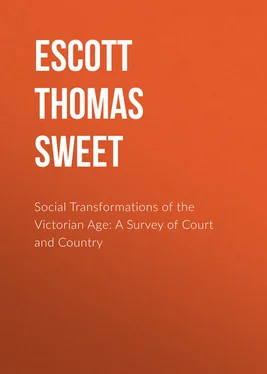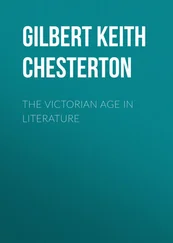His virtuous indignation obscured this critic’s view of the fact that the peer he praised was identical with the peer he denounced.
If this were the context in which to illustrate the political permanence of the Young England agency, it would be enough to point to the perpetuation in the knights, dames, and chancellors of the Primrose League, of the sensibility to picturesque or semi-feudal effects which inspired Disraeli and his friends in their manipulation of Conservative sentiment. These qualities, at an interval of just half a century, were to reappear in Disraeli’s aptest 20 20 Not, however, the most appreciated by his master.
pupil, Lord Randolph Churchill. As a social and unpolitical testimony to the quickening power of the new England propaganda, when its promulgation was an affair of yesterday, it may be mentioned that at the Queen’s accession, as for many years thereafter, it was comparatively an unknown thing for the private parks surrounding gentlemen’s houses in the provinces to be used as people’s pleasure grounds. Show places on such a scale as Blenheim or Chatsworth existed then as they exist to-day. Even in the case of the former of these, in præ- Coningsby or ante-Victorian days, it is not likely to have occurred to a Duke of Marlborough, as it did occur to the seventh successor of John Churchill, being the eighth Duke, to engage a special train to convey several thousands of East End children from their native courts and alleys to the undulating woodlands of his Oxfordshire park. Within a few years of the appearance of Coningsby , Eaton was only one of the great parks which, so long as certain reasonable restrictions were observed, became not less free to town or country labourers with their wives and children than Kensington Gardens, or, as what till our age was called Battersea Fields. 21 21 Now of course Battersea Park.
Royal patronage had not been withheld from the movement. The memories of the present generation stop short of a time when Windsor Park, together with the gardens and terraces of the Castle, was inaccessible to excursionists by the Great Western Railway to view the natural panorama bright with all the beauties of ‘blossom week,’ or to hear the band on the slopes play the favourite pieces of the Queen. The capital was not yet fully abreast with this piece of social progress. Long after the gardens and the general maintenance of the public parks endowed them with fresh attractions, the private pleasure grounds of corporate owners were closed. The new philanthropic reforms were introduced here by the noble structure of the Thames Embankment. The Temple Gardens had, indeed, long been open. The flower beds and their careful tending were still to come. The Benchers of Lincoln’s Inn were more exclusive. The new buildings, as they are called, flanking this enclosure, date from 1845. The Lincoln’s Inn Fields’ theatre had disappeared in 1848. Nearly half a century was still to elapse before the leafy paradise in the heart of this austere kingdom of Chancery law was to ring with childish voices from the courts and alleys which abut on Chancery Lane.
Within fifty years of the Queen’s accession, the personal example of that Lord Shaftesbury whose name has been mentioned already was to bear rich fruit. In the Times newspaper during the earlier sixties, there appeared a leading article on the subject of the homeless poor of London. It was equally noticeable for the humanity which inspired it, and for its vigorous and graphic expression. Not long before this, an interest, then entirely new, had been imparted to the grim subject by an essay in the Quarterly Review based on the then comparatively recent volumes about London labour and the London poor by the brothers Mayhew. A host of writers have treated this subject subsequently. Many of them, conspicuously the late Thomas Archer, with a thoroughness and freshness of knowledge scarcely inferior to that with which it had been approached by the Mayhews. But in their hands the topic was absolutely new. Without hyperbole, in literal truth, the West End was then not only ignorant of how the East End lived, but with very rare individual exceptions, entirely indifferent to the mingled squalor and tragedy of that existence. Horace Mayhew survived to a vigorous and remarkably handsome old age, dying only a few years ago. His work on the deeper depths of London poverty was the one effort of his life. All his energies were thrown into it. The work when finished, if it did not exhaust him, left him so depressed by the misery which he had been investigating that he had no mind to return to the lighter departments of periodical letters wherein his career commenced, and his earlier reputation was made. A long period of social indifference and legislative lethargy as to the condition of the very poor in the capital and in other great towns now ensued. In 1865, the first editor of the Pall Mall Gazette , Frederick Greenwood, conceived the idea of commissioning his brother James, a well known writer on social subjects, to pass a night in the casual ward of a workhouse, rumours of abuses in the management of which were then attracting attention. About a year after this, a winter of exceptional severity afflicted the poorest portions of London, near the Docks and elsewhere, with the combined calamities of lack of labour, and as a consequence with famine, firelessness, and pestilence. Three friends, each of them then young men, all Conservatives by conviction and all under the influence of the philanthropic teaching of Disraeli’s novels, were in the habit of frequently meeting with a view of maturing some scheme for the relief of that destitution at the East End, with which existing agencies of help had proved themselves impotent to deal. One of these belonged to a well known Shropshire family, Baldwyn Leighton. 22 22 Who, to the regret of all who knew his abilities, died February 1897, having exercised influence rather than achieved distinction.
Another, Sir Michael Hicks-Beach, has since become Chancellor of the Exchequer. The third was a son of a former Bishop of Salisbury. Edward Denison was equally quick to master the dominant facts in a social situation, and to take the action that seemed the best thereupon. Within a few days, he decided that the first step towards remedying the evils recorded morning after morning in the newspapers must be personal acquaintance with their magnitude, and their origin, as well as with the habits and homes of the distressed masses. Denison, therefore, established himself in a small house in Whitechapel, the very heart of the necessitous district.
Since then, the example thus set has been followed frequently. Denison of course was sometimes visited in his East End lodging by his West End friends. These returned, bringing with them a more vivid sense of the industrial suffering just outside the doors of the polite world than literary descriptions, however graphic, could convey to the perfunctory reader of the morning paper. Other incidents were to prove unexpectedly instrumental in deepening the interest of well-to-do Londoners in their destitute neighbours. Within a year or two of Denison’s mission, the Fenian outrage at Clerkenwell Prison not only robbed many poor families of their breadwinners, but left them literally homeless. Disraeli, at that time Prime Minister, sent down his private secretary to distribute alms among the victims of the explosion. Mr Montague Corry, since Lord Rowton, 23 23 While he yet lives, his enduring monuments are his blocks of working men’s dwellings in the King’s Cross district and elsewhere.
saw sad and strange sights during this charitable errand. His recital of these experiences was followed by liberal subscriptions to the sufferers from Pall Mall and Mayfair. From that day to this, not only has the stream of charity flowed less sluggishly; there has been also awakened a new personal and intelligent interest in the condition of the most squalid of poverty’s perennial children. That feeling has not evaporated in charitable doles. Substantial funds have been organized by private or corporate munificence for improving the dwellings of the poor and for practically testifying the neighbourly solicitude of more fortunate citizens.
Читать дальше












